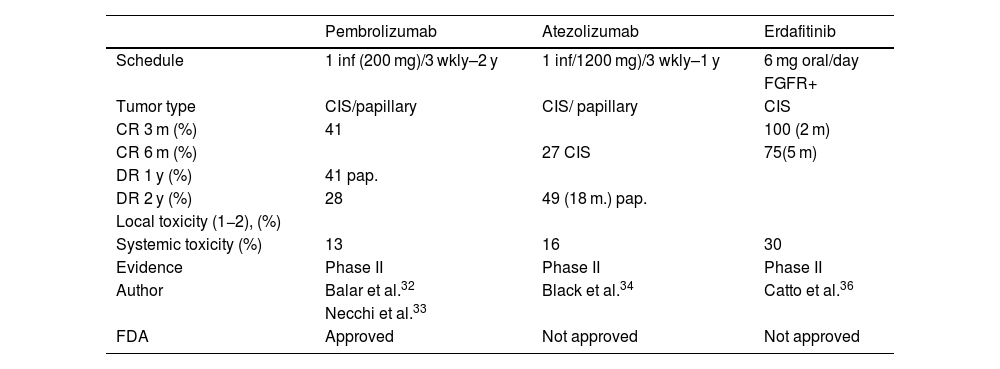Radical cystectomy is the current treatment of choice for patients with BCG-unresponsive non-muscle invasive bladder tumor (NMIBC). However, the high comorbidity of this surgery and its effects on the quality of life of patients require the investigation and implementation of bladder-sparing treatment options. These must be evaluated individually by the uro-oncology committee based on the characteristics of the BCG failure, type of tumor, patient preferences and treatment options available in each center. Based on FDA-required oncologic outcomes (6-month complete response rate for CIS: 50%; duration of response in responders for CIS and papillary: 30% at 12 months and 25% at 18 months), there is not currently a strong preference for one treatment over another, although the intravesical route seems to offer less toxicity. This work summarizes the evidence on the management of BCG-unresponsive NMIBC based on current scientific evidence and provides consensus recommendations on the most appropriate treatment.
La cistectomía radical es el tratamiento actual de elección para el paciente con tumor vesical no-músculo invasor (TVNMI) no respondedor a la BCG. Si embargo, la elevada comorbilidad de esta cirugía y las secuelas que representa para la calidad de vida de los pacientes, requieren considerar la investigación e implementación de opciones terapéuticas de conservación vesical. Dichas opciones, deben evaluarse en comité uro-oncológico de forma individualizada en función de las características del fallo a la BCG, tipo de tumor, preferencias del paciente y opciones de tratamiento disponibles en cada centro. En función de los resultados oncológicos requeridos por la FDA (tasa de respuesta completa a 6 meses para CIS: 50%; duración de la respuesta en los respondedores para CIS y papilar: 30% a 12 meses y 25% a 18 meses), no existe en la actualidad una preferencia clara de un tratamiento sobre otro, si bien, la vía intravesical parece ofrecer una menor toxicidad. En este trabajo se resume la evidencia sobre el manejo del TVNMI que no responde a BCG en función de la evidencia científica actual y se aportan recomendaciones consensuadas sobre el tratamiento más adecuado.









